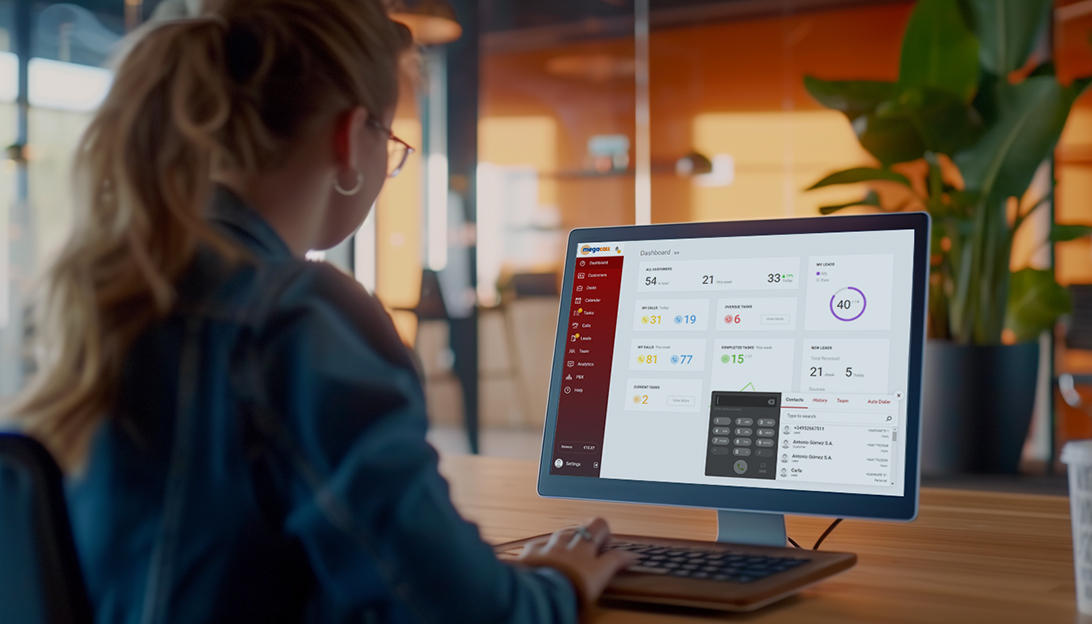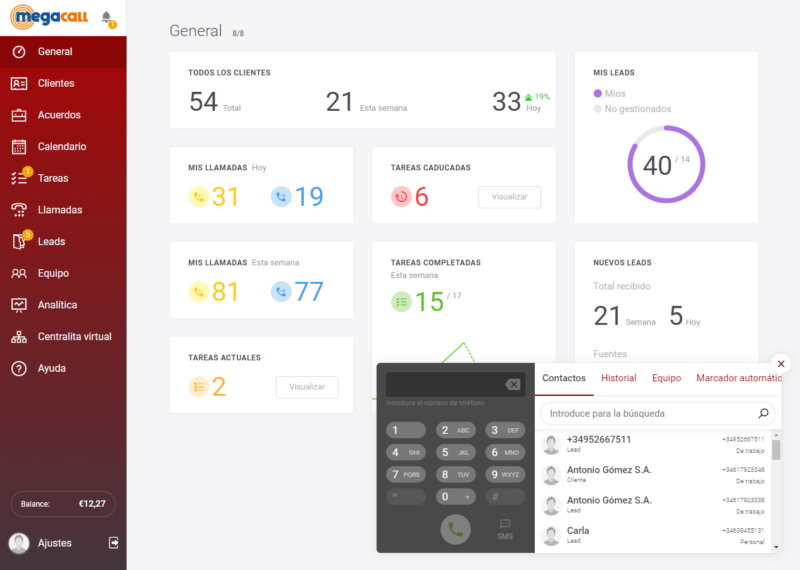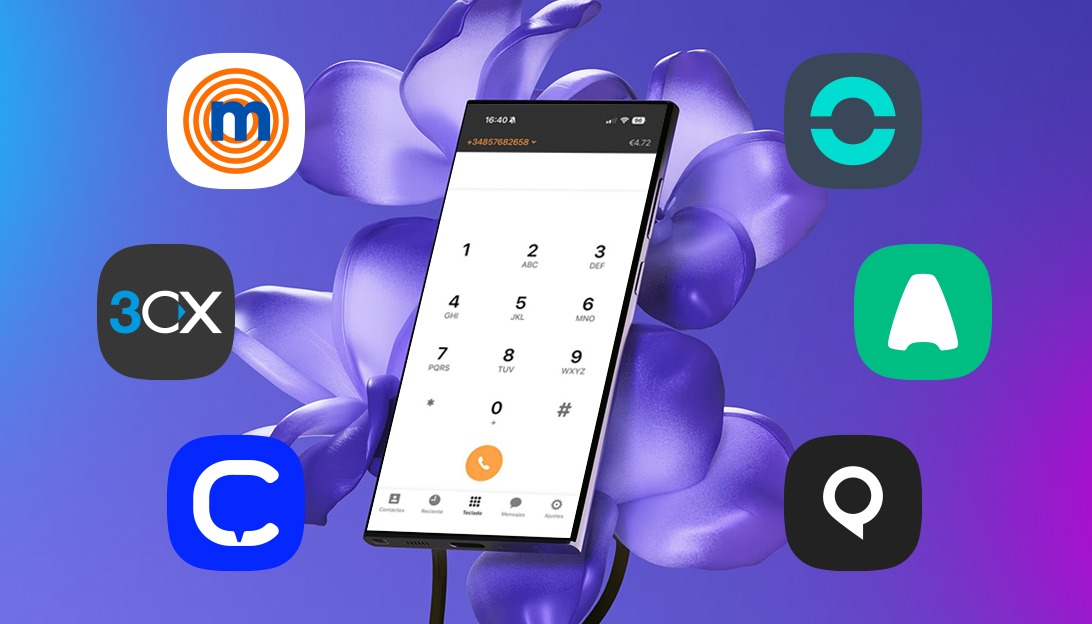
- What benefits does a CRM have for small businesses?
- Criteria for choosing a CRM for SMEs
- Five CRMs for SMEs on the current market
- What is the best CRM for small businesses
The best customer management software will help a company manage and monitor relationships with its current and potential customers by tracking them. Although we know that most large corporations use this software, but what about small businesses?
SMEs generally have a slightly tighter budget but can also access a CRM to increase their customer base and establish better communication management. If you are looking for a CRM for small businesses or you are still not convinced why your company should have a CRM, you will be interested in today’s article dedicated especially to the best CRMs for SMEs on the market, it will help you compare and evaluate the best software of customer relationship management, specifically for SMEs.
What benefits does a CRM have for small businesses?
Implementing a CRM for SMEs can significantly improve the company’s results. By having a centralized platform where all departments can access the same updated information, collaboration is encouraged within the team and, most importantly, good customer service is achieved by having all the information. A CRM can bring great benefits to small businesses:
- Automate data recording.
It saves a lot of time for the company’s agents, since with a CRM the manual and error-prone task of repetitive entry is eliminated, the system automatically captures data from sources such as emails, phone calls or online forms. - Record of communications and interactions with customers and centralized database.
All customer interaction will be recorded in a complete history that allows users to accurately track their customers’ conversations and needs. It provides valuable information and allows you to provide personalized service to them. SMEs will be able to have quick access to customer data as everything is centralized for the sales team. - Optimizes the work of agents.
From CRM for SMEs, you can schedule reminders, prepare contracts, tasks or notes that will help agents not miss anything and, above all, not waste time. - Ability to create sales reports
A CRM collects and analyzes relevant data from conversations and generates detailed statistics and reports on performance, metrics, trends and improvements. The reports help SMEs to have a comprehensive view of their commercial activity, being able to identify moments of opportunity, evaluate the team’s work and measure the strategies applied.
In summary, if an SME has a customer management system, it will be able to know in depth the needs of its customers, reinforce each phase of communication with them, maintain a history and track it, not lose sales opportunities and keep the team up to date.
Criteria for choosing a CRM for SMEs
We know that with a wide variety of options available on the market, selecting the CRM that best suits the specific needs of an SME can be a challenge for many. Therefore, we help you and tell you what criteria to consider first of all, there are a series of factors that cannot be missing to correctly choose a CRM for a SMEs.
- The user interface and usability. Can you see the interface clearly and is the platform easy to navigate? It seems very simple, but not all CRMs have an intuitive interface. A CRM for SMEs must have a simple and easy-to-view platform, with the ability to easily edit fields, and organize the main panel the way the user wants.
- Integrations. Having the possibility of integration with other systems is essential to be able to adapt the company to the functionalities of a CRM, in addition to being able to have access to other tools that the company already has, all in the same system.
- Value for money. A CRM for SMEs must offer a set of functionalities that meets the needs of the company without having a high cost, since they are small and medium-sized companies that don’t have as much budget as large ones. On average, it could be said that the basic plan costs about 20€ (sometimes less), although you may also find that some offer a free version or a free trial.
- Management software functions. A CRM for SMEs should have the option to track interactions, be able to create and edit contacts or leads and view their call history, create tasks and calendar reminders for agents, call recordings and recognition, and have the analytics function, where you can see all call movement. There are some of the functionalities that a customer management system should have at a minimum.
Five CRMs for SMEs on the current market
One of the most interesting options on the market, its ease of use makes it an accessible and flexible solution for growing companies. Its integration with other systems and tools ensures that SMEs can optimize their operations without complications as they can also access reliable technical support.

Megacall CRM not only allows call management on its platform, it presents a management history where you can add tasks, modify them, create contracts, give permission to different agents or assign them a specific task, with a very intuitive interface where you will have the option to customize it to your liking. With the possibility of making calls from the platform, creating a customer agenda, adding or importing databases from other systems and recording calls with voice recognition. In addition, it includes functions for data analysis through different patterns in phone calls, generating results reports. It is perfect for SMEs looking for an all-in-one and collaboration between teams. The best thing about Megacall CRM is that it has a free trial with the possibility of adding up to 5 users and a virtual switchboard.
Salesforce
Although it is one of the best-known CRMs on the market among large corporations, we must mention that it is also one of the most expensive, especially if we are talking about SMEs. Salesforce has a multitude of options and applications on its platform focused on sales, marketing and customer service that allow complete monitoring and vision of the customer. We emphasize that its use is not that simple, in fact, it can lead to spending time training employees to be able to use it correctly. It is a versatile and powerful system but it is difficult to configure and manage without the help of experts and consultants. In addition, it does not have 24/7 customer service and it is quite important detail if we take into account that at first it is not that easy to use. Salesforce has a 30-day free trial, after one month you must contract a plan that suits your company, the simplest pack being 25€ per month per user.
Pipedrive
It is a CRM in which your sales funnel is the protagonist, where you can see the stages according to priority before closing a sale, maintaining control of the marketing process from the beginning. Unlike Salesforce, it is simpler and easier to use but its approach may not be suitable for more advanced and highly customizable workflows. Pipedrive does not have a free version, but rather a 14-day demo of the professional plan. The basic plan is quite limited in functionalities that are very important, such as integrations with One Drive and Google Drive. Compared to other CRM software, Pipedrive has some limitations in email analysis metrics, which can make it difficult to evaluate the performance of email campaigns.
Zoho
Zoho presents an omnichannel platform that is its strong point, allowing contact with customers to be made through various means, and it also has its own virtual assistant. One of the features of Zoho is that it creates bug tracking reports that can be assigned to support representatives. It has a section where you can monitor the status of the project with basic metrics, it is not very advanced and deep, enough for a simple control. The problem is the lack of functions for more advanced users or projects that are more complex, the workload cannot be fully managed. The Zoho dashboard is quite busy, and does not allow you to visualize the work well. Zoho has a free version of the most basic, for teams of up to 3 users and a maximum of 2 projects and 5GB of storage space.
Hubspot
It is a software where it is possible to generate reports and panels to measure the work of the agents and implement improvements in the service. Use AI to use chatbots that help expand communications, qualify leads and schedule meetings. It has an intuitive interface that will not require training but does not have personalized advice in the free version of the software.
After these mentioned advantages, it does present some weak points that are necessary to know, such as the lack of email tracking. From the free plan, email tracking is not possible, it only allows integration with email, website and Facebook, if you want to choose more integrations you must contract a paid plan. In turn, the free plan can be found with predetermined reports, so customization is not possible.
What is the best CRM for small businesses
As we have seen throughout this article, the vast majority of CRMs for SMEs offer a free version but many are of short duration and with many limitations in terms of functionality, that is, to really know if you like it or not you have to try all its functions and to do so you will have to pay for a plan.
In the end, the best CRM for SMEs is one that not only allows you to access all the functions to manage your business, but also adapts to the budget limitations that a small business may have. That is why Megacall CRM is perfect for a small and medium-sized companies, since you can try all its functions for free, with reliable technical support and the ability to integrate with other tools, with the possibility of customizing fields and order of the dashboard for better visualization, Megacall CRM offers everything an SME needs to improve its competitiveness and position itself in the market.
We invite you to try Megacall’s free CRM for SMEs!
You may also like…
Discover the advantages of Megacall's AI voice agent.
February 10, 2026
The best softphones for businesses and professionals
January 27, 2026



